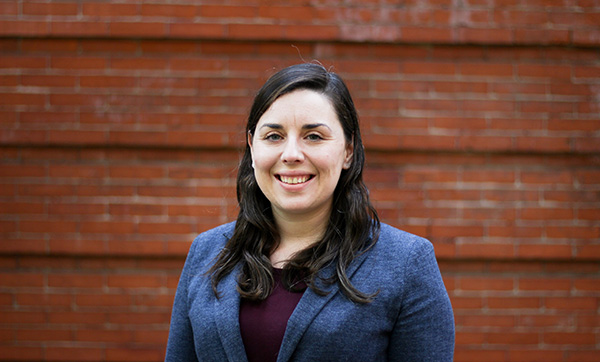Professor Receives $2 Million NIH Early Career Award.
Professor Receives $2 Million NIH Early Career Award
Mary Willis, a new assistant professor of epidemiology at SPH, received the National Institutes of Health Director’s Early Independence Award to study the influence of oil and gas development on reproductive health.

Mary Willis, assistant professor of epidemiology, has received a 2022 National Institutes of Health Director’s Early Independence Award to study the effects of oil and gas development on reproductive health.
Willis, who joined the School of Public Health in September, is the first Boston University recipient of the prestigious research award, which totals $2,062,995 over five years. The grant is part of the NIH Common Fund’s High-Risk, High-Reward program, which offers four programs each year to support innovative scientists who propose impactful behavioral and biomedical research projects. The Early Independence Award is geared towards junior scientists who have recently received their doctoral degree or completed their medical residency, and the award enables them to skip traditional postdoctoral training and move quickly into independent research positions.
The project will be the first prospective study on oil and gas development and reproductive health outcomes, utilizing the ongoing data collection from Boston University’s Pregnancy Study Online (PRESTO), the largest preconception cohort study ever conducted. Many PRESTO participants are also among the 17 million Americans who live near active oil or gas development sites.
The industrial activities at these sites produce air pollution, water contamination, and known reproductive toxicants, says Willis, who has studied oil and gas development since 2015, and has established expertise in environmental epidemiology, data science, and reproductive health.
“This project aims to create rigorous epidemiologic evidence that can inform health-protective policy with respect to oil and gas development,” Willis says. “Right now, there is not a great consensus as to what aspects of the industry should be regulated to protect local populations—do we need to zone this industry further away from residences, regulate the air pollutants in a specific development phase, or consistently monitor local water quality? Generating this sort of multi-pronged epidemiologic evidence is a key step towards figuring out what options may yield policy that could protect population health.”
During her master’s and doctoral programs in public health at the University of Rochester and Oregon State University, respectively, Willis received a National Research Service Award from the National Institute of Environmental Health Sciences to lead studies on oil and gas development in Texas and Pennsylvania. She found that living near the industry was associated with increased prevalence of childhood asthma hospitalizations, decreased term birth weight, and increased risks of pregnancy-related hypertension.
“I also heard from affected communities that some of them were worried about infertility and miscarriage, which are very difficult to measure in population-based data sources,” she says. “I wanted to design my next studies to respond to these specific reproductive health questions as effectively as possible.”
Now, Willis will use a combination of spatial data integration, individual survey data, and personal environmental monitoring to captures key concerns related to this industry. She will assess these exposures in relation to fertility, pregnancy loss, pregnancy complications, and birth outcomes.
“Down the line, this research may inform projects that partner with local communities to examine the efficacy of personal or policy interventions for exposures related to oil and gas development,” Willis says.
NIH issued a total of 103 Director’s Awards this year, including 13 other Early Independence Awards, 8 Pioneer Awards, 72 New Innovator Awards, 9 Transformative Research Awards.
“The science advanced by these researchers is poised to blaze new paths of discovery in human health,” says Lawrence A. Tabak, who is performing the duties of the director of NIH. “This unique cohort of scientists will transform what is known in the biological and behavioral world. We are privileged to support this innovative science.”